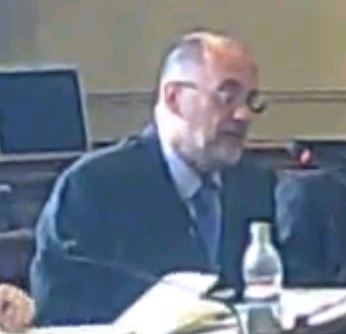Lyndale School Consultation Meeting: Julia Hassall “we’re not having straightforward consultation” (part 10)

Phil Ward (Wirral Council’s SEN Lead) at a later meeting of Wirral Schools Forum 2nd July 2014 (who chaired the consultation meeting at Acre Lane on the 16th June)
Please accept YouTube cookies to play this video. By accepting you will be accessing content from YouTube, a service provided by an external third party.
If you accept this notice, your choice will be saved and the page will refresh.
Lyndale School Closure Consultation Meeting 16th June 2014 (Audio only)
Continues from Lyndale School Consultation Meeting: Cllr Dave Mitchell “They need the care they’ve got!” (part 9).
This transcript below starts at 1:05:50 in the video above.
DAVID ARMSTRONG (ASSISTANT CHIEF EXECUTIVE)
Just before we get to it, just before we get to it, I’ll just make the point about you’ll know there a number of people sitting here who will know we’re having discussions about Elleray Park and Stanley …(unclear)… and more recently we’ve been having discussions about Foxfield based on comments that have been made towards us.
Subsequently and clearly I’ve got to talk about the nature around the Wallasey School, but what was referred to was Wallasey School is currently based at an outpost base where inevitably …(unclear)… similar …(unclear)… some space …(unclear)… and I think that’s a very short-term arrangement, so it’s nothing at all to do with the Lyndale School.
TOM HARNEY (CHAIR OF GOVERNORS)
Well thanks for that point about a shared site.
JULIA HASSALL (DIRECTOR OF CHILDRENS’ SERVICES)
Can I just come back to the point the gentleman made at the back you know? I’ll come back in a minute on what Alison McGovern said. You’ve said why haven’t we got parents at the front telling?
GENTLEMAN AT BACK
I said there’s, I don’t want to object, but whether it was legal.
JULIA HASSALL (DIRECTOR OF CHILDRENS’ SERVICES)
and I had a meeting with the Chief Executive of the Council, Graham Burgess. There were three parent governors, two of whom are here tonight and they said to Graham Burgess and myself, it feels like we’re not having straightforward consultation about some of these issues. We don’t know err what you’re doing to investigate the other eight options along with the other proposals that have come forward and what we have done and what Alison McGovern also said was I think, was is there something about, can you recreate Lyndale ethos in a different setting? Can you explore that and so we’ve had one meeting so far, we’ve got another meeting on Friday, to try and have a different kind of conversation about how we explore all the different options because I think the gentleman here raised the point when we were at the Floral Pavilion, it feels like when we have these meetings sometimes you can, questions from the floor, we know we kind of almost it feels like defend the position, whereas you can with smaller groups sometimes saying you can have a different kind of conversation but we’re doing that in tandem with these meetings to try and flush out all the different options and look at them in real detail.
GENTLEMAN FROM AUDIENCE
OK, well can I just say that the replication of Lyndale and that’s what I want to talk about. Lyndale even though we knew at the beginning of the year and it’s fully documented, it says many of the children have had PMLD [profound and multiple learning disabilities], it’s the actual, it’s the vast majority, it’s almost all the children.
JULIA HASSALL (DIRECTOR OF CHILDRENS’ SERVICES)
It is.
GENTLEMAN FROM AUDIENCE
So, the reason why Lyndale is so effective in that area is because it’s a small, lovely school and it does feel like, it does feel like a home and people say …(unclear)… 0.1%, it’s the very most vulnerable of our children. So they are all, this facility actually caters for them because they are vulnerable, they are vulnerable to other more boisterous children in care.
They need more responsible adult care, they are in the absolute …(unclear)… in this Borough and the reason why I’ve gone round approaching all those businesses, is because one hundred percent of the people think that that 0.1% of our most vulnerable children should be the …(unclear)… number one priority on everybody’s agenda and everything else should come second to this.
He received a round of applause for what he had said.
1:09:00
If you click on any of these buttons below, you’ll be doing me a favour by sharing this article with other people. Thanks: